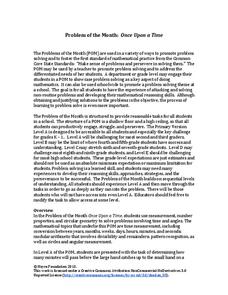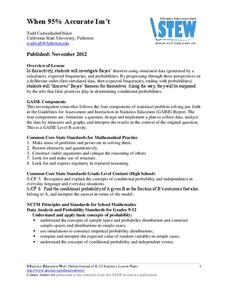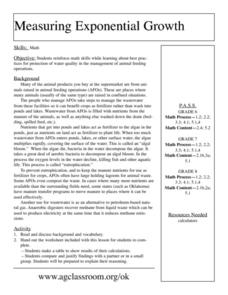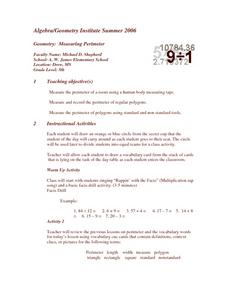Virginia Department of Education
Exponential Modeling
Investigate exponential growth and decay. A set of six activities has pupils collecting and researching data in a variety of situations involving exponential relationships. They model these situations with exponential functions and solve...
Virginia Department of Education
Curve of Best Fit
Which function models the data best? Pupils work through several activities to model data with a variety of functions. Individuals begin by reviewing the shapes of the functions and finding functions that will fit plotted data points. By...
Noyce Foundation
Once Upon a Time
Examine the relationship between time and geometry. A series of five lessons provides a grade-appropriate problem from elementary through high school. Each problem asks learners to compare the movement of the hands on a clock to an angle...
Curated OER
Scale Activities
How do you put something as large as the universe in perspective? Use a series of scale experiments. Classmates collaborate around four experiments to examine the scale of the earth-moon system, our solar system, the Milky Way galaxy,...
Statistics Education Web
When 95% Accurate Isn’t
Investigate the effect of false positives on probability calculation with an activity that asks scholars to collect simulated data generated by a calculator. To finish, participants analyze the probability of certain outcomes which lead...
Curated OER
Roller Coasters
Twisting and turning through the sky, roller coasters are popular attractions at amusement parks around the world, but how exactly do they work? Explore the physics behind these thrilling rides with an engineering design activity....
Project Maths
Inequalities
Which number is bigger? Using a variety of activity sheets, this unit starts with the basics of inequalities and progresses through solving compound linear inequalities. Problems cover the range of inequalities including inequality word...
Virginia Department of Education
Work and Power
Assist your class with correctly calculating the values for force, work, and power as they determine the amount various activities require. They gather data and participate in a group discussion to compare results upon conclusion of the...
US Department of Energy
Solar Cooking
Who needs a barbecue grill to cook hot dogs when you have the amazing power of the sun at your disposal? Engage young scientists in learning about solar energy with this fun activity that turns a used Pringles can into a solar...
Statistics Education Web
Did I Trap the Median?
One of the key questions in statistics is whether the results are good enough. Use an activity to help pupils understand the importance of sample size and the effect it has on variability. Groups collect their own sample data and compare...
University of Colorado
Great Red Spot Pinwheel
The great red spot on Jupiter is 12,400 miles long and 7,500 miles wide. In this sixth part of a 22-part series, individuals model the rotation of the Great Red Spot on Jupiter. To round out the activity, they discuss their findings as a...
Center for Technology in Teaching and Learning
CSI: The Experience - Family Forensics
Forensic scientists depend on their observation skills to analyze evidence down to the molecular level. Middle and high schoolers practice making observations and predictions with a series of crime scene activities, which includes a...
Safe Drinking Water Foundation
To Filter or Not to Filter
Drinking clean water can be taken for granted. Explore the process and high cost of filtering water with a water pollution and filtration activity. Young scientist build a filtration system to filter polluted water, examine the economics...
NOAA
Mapping the Deep-Ocean Floor
How do you create a map of the ocean floor without getting wet? Middle school oceanographers discover the process of bathymetric mapping in the third installment in a five-part series of lessons designed for seventh and eighth graders....
K20 LEARN
Transpiring Trees: Plant Transpiration and the Water Cycle
Looking for a tree-rific addition to your water cycle unit? Teams of young foresters examine the role of transpiration in the water cycle through a week's worth of activities. Pupils analyze how trees take in and transport water during...
Las Cumbres Observatory
Measure the Age of Ancient Cosmic Explosions
Supernova explosions mark the end of a star's life. Guide the class through an investigation that uses data to calculate the age of a supernova remnant. Using provided data and online software, they analyze data to determine the radius...
Curated OER
Everyday Measurements
Fourth graders practice measuring items with unconventional methods. In this measurement prediction lesson, 4th graders estimate the length of items a teacher brings to class and record their predictions. Students measure the...
Curated OER
Classify and Measure Angles
In this angles learning exercise, students use a protractor to measure and classify a set of 9 angles. A reference web site is given for additional activities.
Curated OER
Measure the Lines
In this measuring instructional activity, students cut out a measuring bar and use it to measure and color designated matching numbers.
Curated OER
Measuring Temperature
Young scholars examine how to determine temperature on a thermometer. They read and discuss an informational handout, discuss examples of Fahrenheit and Celsius scales, and complete a worksheet.
Curated OER
Measuring Exponential Growth
Students reinforce math skills while learning about best practices
for protection of water quality in the management of animal feeding
operations. They make a table to show results of their calculations and compare and justify findings...
Curated OER
Perimeter Playground
Students explore geometry by participating in a school measuring activity. In this perimeter lesson, students discuss the techniques and methods used in order to measure a large perimeter or geometric figure. Students utilize grid paper,...
Curated OER
Measuring Perimeter
Have your class practice measuring the perimeter of various objects using this resource. Fifth graders place various-sized polygons in order (from largest to smallest). They use non-standard measuring tools to estimate the distance...
Curated OER
Measure Twice, Cut Once
Elementary schoolers learn about metric units and how they are used by engineers. They learn how engineers use the units to measure mass, distance, and volume. Then, they estimate measurements of units, and compare them to actual...

























